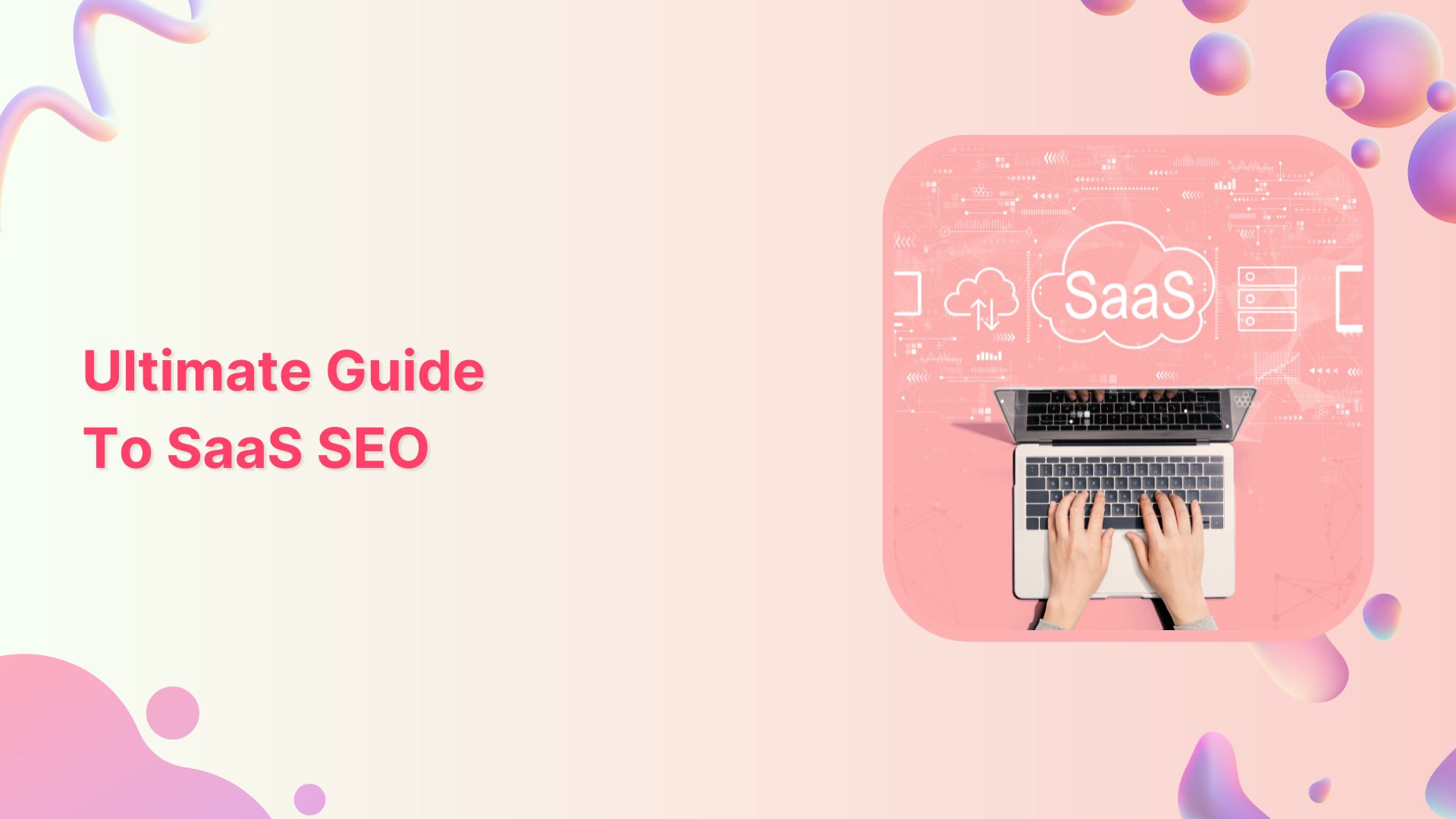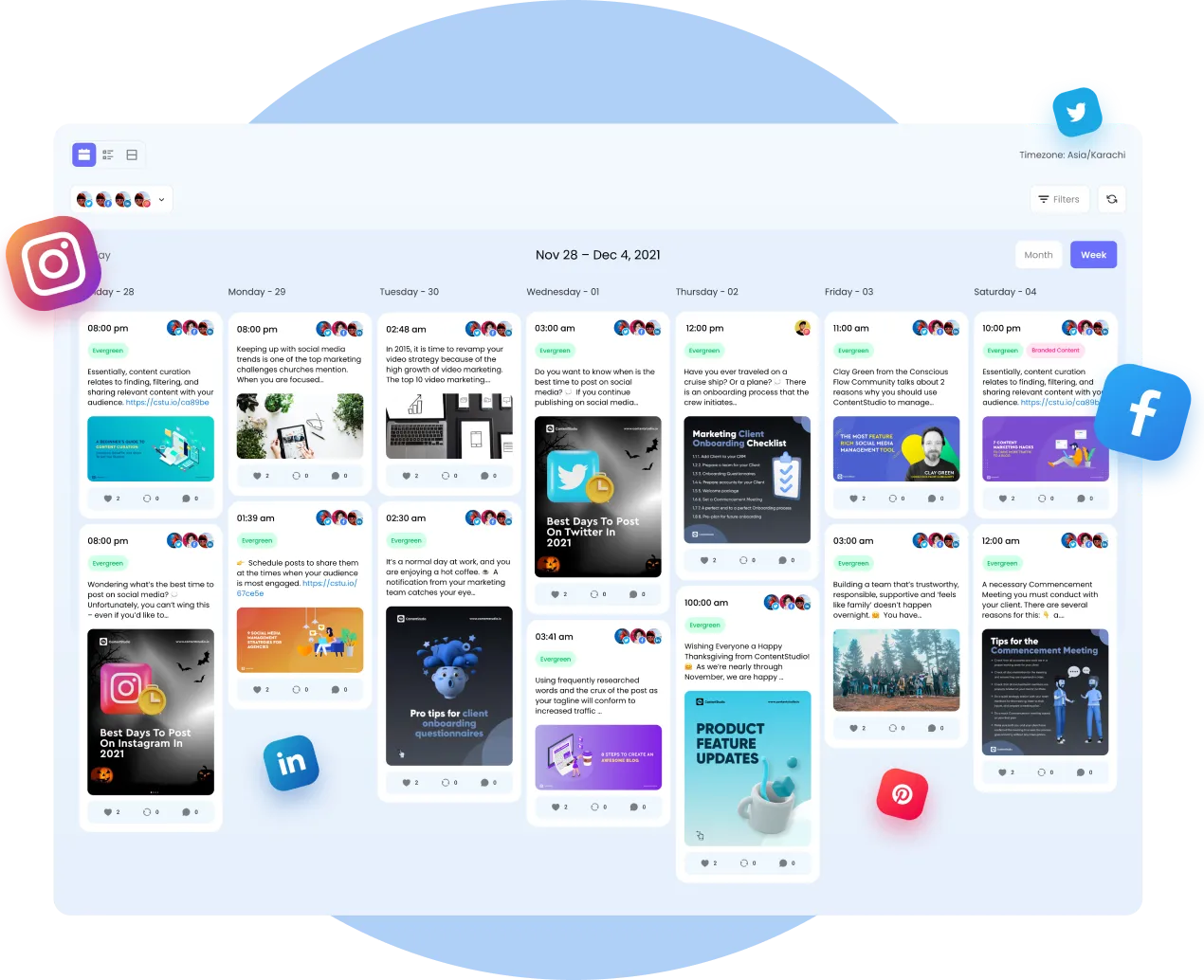SEO is an integral part of any digital marketing campaign. No wonder e-commerce stores, B2B companies, solopreneurs, and software-as-a-service (SaaS) businesses are adopting SEO to stay relevant and beat the competitors.
It’s a no-brainer that most SaaS companies have a full-fledged SEO team that consists of SEO experts, content writers, and link builders. They closely work with digital marketing team members such as social media managers, Facebook/Google ad experts, and graphics designers.
If you haven’t had a chance to explore SEO before, then here’s your best to understand this phenomenon. Pay attention to this now!
SEO stands for search engine optimization. It’s a process of optimizing website pages, content, links, and layout to make the website easily accessible to search engines as well as users.
Now let’s head over to the next section and try to comprehend why SEO is important for SaaS companies.
What is SaaS SEO?
SaaS SEO means crafting, implementing, and analyzing the search engine optimization strategies for a SaaS business with a specific end goal in mind, such as lead generation, paid customer acquisition, investor hunting, etc.
Since SEO is responsible for driving website traffic through search engines, it’s vital for a SaaS company to pay close attention to the SEO processes.
Undoubtedly, most SaaS businesses heavily rely on the organic visitors that land on their websites through search engines. It’s necessary for online businesses to hone in on this growth hack to leverage the attention of online searchers.
There are essentially two ways to drive traffic from search engines:
i. Organic traffic
Every web-based business that relies on the search engines’ organic traffic should have the basic how-know of this marketing channel. The SEO experts rank website pages by optimizing the content for certain keywords. The organic traffic is purely driven through SEO tactics and strategies.
ii. Search engine marketing
On the other hand, search engine marketing involves paid advertising campaigns. Digital marketers who want to drive massive traffic to websites within a short time go for paid ads. This type of advertising is known as search engine marketing. It is important to get useful information for your campaigns, as Google is the largest search engine, so you can always scrape Google data from its search engine.
Remember that SEO for SaaS isn’t a one-size-fits-all strategy. Every SaaS business has a different target audience. Therefore, each SaaS company must shape its SEO strategy according to the brand persona.
The importance of SEO for SaaS: Why you need a solid strategy
Most SaaS and e-commerce businesses heavily rely on paid ads to generate leads and sales. Therefore, it’s vital for such businesses to pivot their marketing strategy and look out for other options.
SEO for SaaS companies allows them to find alternative yet cost-effective website traffic opportunities to generate leads and convert visitors into paying customers.
It’s true that driving website traffic is no easy task. Every brand needs to have a powerful and effective SEO strategy in place to generate organic traffic from search engines.
We’ll get to the exact SEO strategies every SaaS business should implement after discussing why it’s absolutely vital for SaaS to pay close attention to SEO.
Here are some important factors why SEO is crucial for SaaS’s success:
i. SEO is an essential website traffic-driving force



You need to wrap your head around SEO as it’s a doorway to getting thousands if not millions of organic website visitors to your website, blog, or landing page.
No wonder top brands spend hundreds of thousands of dollars on SEO. They put out content, build backlinks, publish on social media, and collaborate with influencers. One of the reasons why brands and companies put their marketing resources to work is that they know about the ROI.
For a dozen of those who don’t know much about SEO for websites and blogs, it’s a major website traffic-driving source. Sure, social media could do it for you but it won’t be as smooth as SEO.
Some companies go hard on social media paid traffic instead. The reason is that SEO takes at least 6 to 8 months to showcase some movement in the graph.
On the other hand, social media paid advertising starts to show results in a week or so depending on the campaign targeting and performance.
However, SEO traffic is more effective if it is done right. Since it brings the website visitors organically, they have a need to be fulfilled. For instance, they need a solution or a product and once your content fulfills their needs, they’re all yours.
ii. Ignoring SEO allows competitors to take over the opportunities



Competition analysis and search engine optimization go hand in hand. You can’t do SEO on a business website or even a blog without keeping an eye on the competitors.
If you’re skeptical about putting your time and energy into SEO, then you might be missing out on a lot of opportunities.
Just remember that the time you’re spending on brainstorming whether or not you should dive deep into SEO, the competitors would be pouring their hard-earned money into creating SEO content.
Do you really think you could go ahead of them simply by ignoring SEO? If you think so, you couldn’t be more wrong.
iii. SEO helps land website visitors with a buying intent



Since SEO is a mainstream website traffic-driving source, it’s the most effective tool to convert the audience into paying customers. There is an explanation for that as well.
The reason why SEO traffic is crucial to any online business is that SEO brings visitors with an intent. All brands and SaaS companies need to do is fine-tune their content strategy to bring in website visitors with buyer intent.
It’s not rocket science to figure out how to land website visitors with buyer intent. What you need to do is to understand:
- How your niche works
- What the audience struggles with
- How your product or service would help them
- Why prospects should choose your product over competitor’s
Once you have sorted all these things out, you could start infusing all these answers into your content. Make sure you have done your homework on the relevant keywords beforehand.
You could start seeing the traction within two or three months considering everything else goes right, for instance, your pages are being properly indexed in Google, your website page loading is pretty much, and your content is great.
iv. Effective keywords targeting generates leads and improves conversion
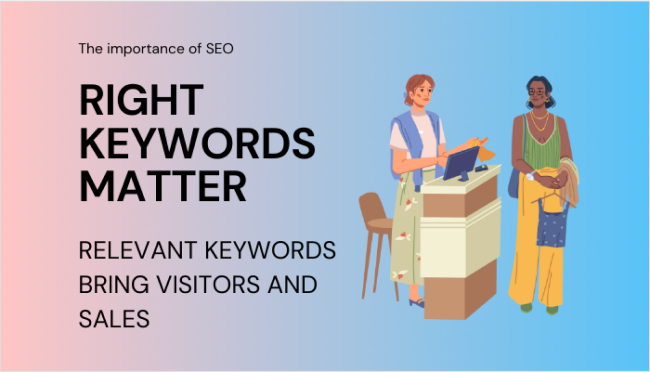


A lot of you might suggest that you need an SEO audit and technical SEO for SaaS growth. While that’s not entirely untrue but if you’re just stepping into it, consider taking baby steps first.
There is no need for an apples-to-apples comparison between your SaaS company and a multi-national brand that is crushing it with SEO. Here’s why: they might be spending thousands of dollars every month and you may not afford to do it just yet.
Therefore, try to understand how keyword research works. Start doing effective keyword hunting to generate leads. Once the lead generation begins, the conversion rate would go up.
A SaaS startup needs early traction and targeting low-competition keywords on the blog would set the stage for it. Just make sure that the blog content is top-notch so that it hits the bullseye.
v. SEO is comparatively cheaper than paid ads and sponsorship



Some might disagree that SEO is cheaper than paid ads, influencer marketing, and sponsorship deals. However, my counterargument is that most paid ads and sponsorship campaigns are fruitful when they continue for months.
On the other hand, you could hire a freelance SEO consultant or a content writer for a specific job and that’s it. You won’t have to pay a recurring payment every month.
In some cases, companies have in-house SEO experts who take care of backlink outreach, on-page SEO, off-page SEO, content updating, and content publishing themselves.
It’s no surprise that most SaaS companies start their digital marketing campaign with SEO and later add paid social media ads to their marketing mix.
A 6-step SaaS SEO strategy
SEO is inevitable in modern-day digital marketing. So we must embrace the fact that we need to allocate resources, time, money, and energy toward establishing and implementing an SEO strategy for our SaaS business.
It’s not as easy as it may sound but if you comprehend the fundamental steps of SEO, you’ll be fine. A bunch of you might be wondering how the heck we’re going to do this. Well, I’ve got you covered.
Here’s my 6-step SaaS SEO strategy that you can steal right away:
Step #1: Identify your target audience
Building an SEO strategy is not all sunshine and rainbows. You have to put some serious thought into building this game plan.
The first thing that comes to mind when building an SEO strategy is FINDING THE KEYWORDS, and that’s where most people make a mistake. They immediately go after the keywords hunt.
While keyword research is an important step in the SEO process, it’s important to pay attention to what comes before the keyword hunt.
It’s figuring out who you want to reach out to. Identification of the target audience gives you a pedestal to hop on and move to the next stage.
Therefore, put your thought into understanding and finding the right audience to target through your keywords, content, hashtags, etc.
Example: ContentStudio



If you scroll through the ContentStudio blog feed, you’d notice that the majority of the content revolves around social media marketing.
More importantly, the content targets social media managers, social media influencers, bloggers, and businesses – pretty much anyone who wants to take their social media growth to the next level.
Step #2: Choose your online marketing arsenal
Next up is the set of tools to use for online marketing. SEO is much more than blind guesswork. So you have to be prepared to invest in some tools and resources to get some traction.
Brands and SaaS companies won’t mind investing some money into buying subscriptions to use SEO and digital marketing tools. So you shouldn’t be hesitant either.
Just make sure that you aren’t foolishly buying unnecessary tool subscriptions. However, I might pinpoint some of the popular tools you could check out for your online marketing arsenal.
- Keyword research tool: Keyword research tools like ahrefs or Semrush are the top guns in the SEO realm. Don’t overlook LowFruits or Keyword Chef if you need keyword research on a budget.
- Social media management dashboard: If you want to crush it with your social media content distribution, then you need to do social media publishing on autopilot. Try ContentStudio for social media scheduling and distribution.
- Writing and grammar checker: Grammar and spelling checking tools are everywhere – try Grammarly, Quillbot, and Jasper tools for streamlining your content writing plans.
- Online graphics designing tool: Use Canva or Crello for designing social media and featured blog post images and make your content more juicy and engaging.
- Video editor and content generator: If you aren’t using video on social media and blogs, you’re perhaps missing out on the visitors’ engagement opportunities. Use Veed.io, Offeo, or Filmora for video editing and content creation.
These online marketing tools aren’t the only tools on the market. You could always ask for recommendations on Quora and Twitter to see what tools others are using right now.
The point is that you got to have some tools in hand to start working on your SaaS SEO.
Example: Resources Page



I built a resources page on my blog a long time ago. It still helps readers after years. All I did was that I mentioned all the tools I use on a page and made it public.
Plus, I changed some of the links to my affiliate links, but of course, I disclosed that in the intro.
The purpose of building this simple page was to showcase my online marketing arsenal. Moreover, I started directing people to the resources page whenever someone asked for an online tool recommendation.
Step #3: Pick the relevant keywords to target
Once everything goes well at the beginning, you’ll reach this point in no time. Choosing the relevant keywords to target in the SaaS SEO campaign is a fundamental step to growing your organic traffic.
It’s exactly what it sounds like. You have to go after the relevant keywords. However, it ain’t that easy. Picking the relevant keywords means targeting the industry-related keywords. However, make sure the keywords are underserved. Otherwise, they won’t help you.
Most beginner bloggers and SEO experts make the common mistake of targeting high-competition keywords due to the higher number of searches every month.
They think since high-competition keywords are in demand, so they could get their share of the pie without a problem. This is exactly where they’re wrong.
High competition means there is no chance for new players. Since search engines reward high-authority sites that have been focusing on high-competition keywords for years, there is no way a new website takes over a top spot in a million years. So, it’s a red flag without a doubt.
Therefore, try focusing on finding the most relevant, niche keywords you could possibly find and filter the low-competition keywords to target. Just remember that low-competition, relevant keywords might be longer than usual short keywords.
Example: Parrots-related blog
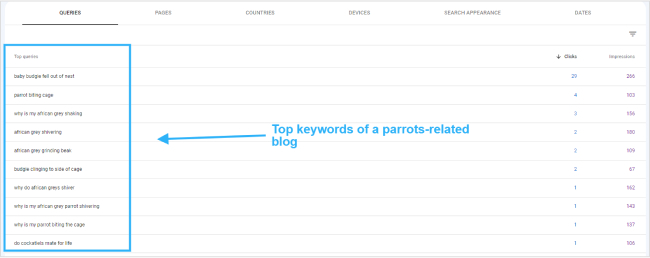


I once started an experimental content website on parrots. It quickly started getting traction because I was only targeting the specific, relevant keywords in the content.
It’s a true testament to what happens if you choose the relevant keywords and put out content around that.
Step #4: Publish authoritative content
One of the key factors of successful technical SaaS SEO is to use authoritative and high-quality content to your advantage. A lot of brands chase topical authority by publishing high-quality content at scale.
Quality is as important as quantity. Perhaps, the bulk publishing on the relevant topics may not make such a difference unless it’s good-quality and effective content.
SaaS businesses must focus on the areas where their prospective customers are vulnerable the most or struggle. It’s best to opt for the topics in the niche that haven’t been covered by any competitor yet.
SEO and high-quality content go hand-in-hand as keywords and relevant content help rank the pages in search engines, which bring in organic traffic to the website.
Any SaaS company that wants to dominate the search engine rankings on Google and other search engines must double down on publishing high-quality content without an authoritative voice.
Example: Clockify Blog
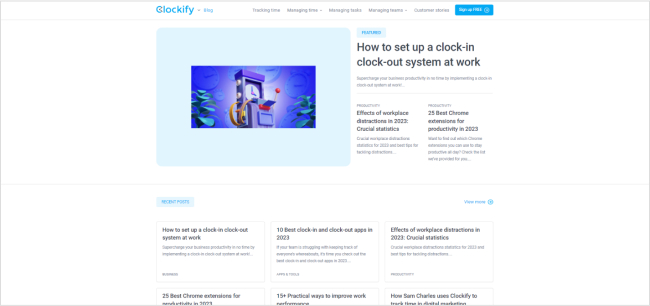


Clockify is a time tracker tool that provides time-tracking solutions for bloggers, freelancers, and managers.
They publish in-depth, engaging content on their blog to not just educate the audience but also to convert the readers into users.
Step #5: Build E.E.A.T for your SaaS business
E.E.A.T. stands for experience, expertise, authoritativeness, and trustworthiness. It’s Google’s quality rater guideline for ranking websites in SERP.
To build E.E.A.T for your SaaS business, the company must focus on all necessary signals that portray a positive image of the brand.
A lot of companies emphasize a lot on social media – they actively engage with followers on social media more than their competitors. Some companies host free webinars or social events to get together with their customers and service providers.
Establishing E.E.A.T. doesn’t necessarily mean marking items on a checklist. In fact, it’s more of a collective effort to solidify a brand’s position in Google’s eye.
More importantly, it doesn’t happen on a whim. Instead, you should put time and energy into building relationships with industry experts, influencers, and brands.
Influencers use social media to engage with brands and followers or they guest post on industry-relevant blogs to educate the audience. The purpose is to get recognized by reaching new audiences through these actions.
Ultimately, these efforts help them develop E.E.A.T along the way.
Example: Jared Bauman



Jared is the CEO of 201 Creative. He runs a US-based digital marketing agency and hosts a podcast called Niche Pursuits.
I stumbled upon his guest post on a blog and it immediately caught my attention because he often talks about building E.E.A.T on the podcast.
For those who haven’t figured out why Jared guest posts on different blogs, let me explain it in one line. He does guest posting to brand positions in personal brands, and thus, it contributes to building E.E.A.T in the eyes of Google.
Step #6: Pay attention to both on-page and off-page SEO
One of the fundamental things no one should miss out on while building an SEO strategy for a SaaS business is to fix the on-page and off-page SEO.
Most SaaS founders and CTOs might not know about on-page and off-page SEO. The on-page means the SEO techniques that SEO experts apply to the website. Whereas, the off-page strategies are the ones that are implemented outside the website.
To get started with your on-page and off-page SEO, you must optimize your website for the right keywords, internal linking, page speed, good-looking web design, etc.
On the other hand, pay attention to backlinks, no-link mentions, social media brand mentions, guest posting, etc.
Most startups and SaaS companies hire a team of SEO and content writers that publish high-quality content, build backlinks, guest post on relevant blogs, and talk about the brand on social media.
That’s exactly what needs to be done when doing a SaaS SEO.
Example: Streamyard
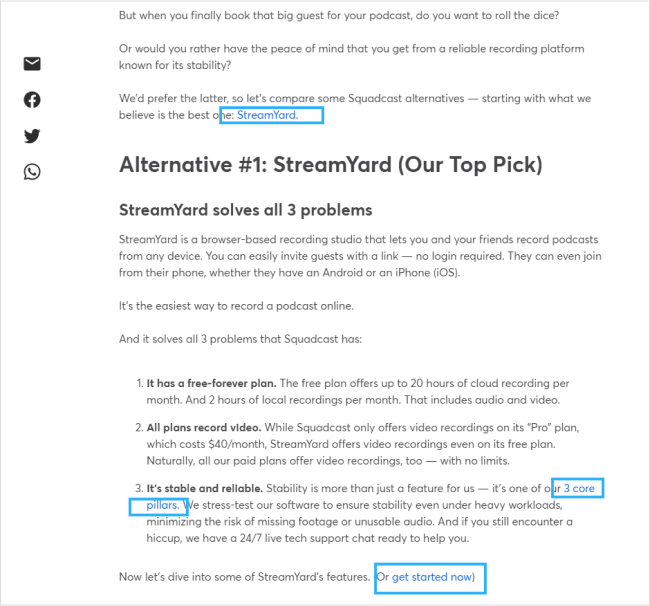


The team at Streamyard knows the importance of SEO. Therefore, they create internal links to their other blog posts and key website pages in their content. And that’s one of the key elements of SEO.
5 Tips for SaaS SEO
There is a whole heap of SaaS SEO guidelines that experts share all over the internet. However, there are a few suggestions that are worth mentioning here.
Here are five useful tips for SaaS SEO:
i. Publish high-quality, linkable blog content
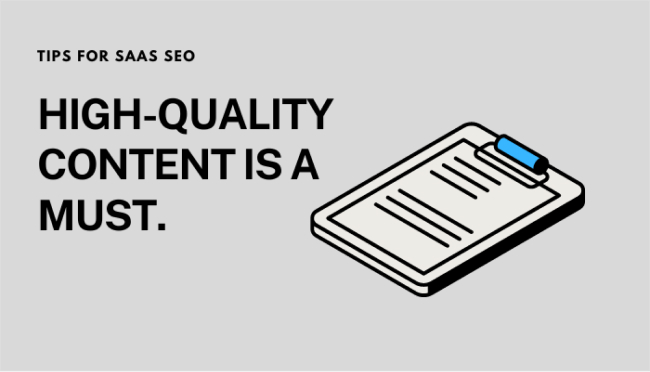


Publishing good quality and useful content is quite a popular advice for SEO and blogging success. It’s understandable that high-quality content helps in engagement, lead generation, and conversion.
There is no right or wrong definition of high-quality content. The only indicator is that it helps the readers and encourages the audience to share it.
One of the lesser-known facts about publishing high-quality content is that it becomes linkable content, meaning brands and publications link out to useful content.
Social Media Content Calendar
Stay consistent and organized with Contentstudio’s social media content calendar for marketers and agencies.
Get Started for FREE


ii. Use video platforms to engage with the audience



The video has become a vital tool in modern-day SEO games. The reason is that Google features YouTube videos in the SERP (where they’re required) and social media engagement contributes to establishing EEAT for businesses.
YouTube, TikTok, Reels – any social media video platform is a must-use platform in today’s SEO. It’s necessary to understand how to utilize social media platforms for SEO.
There are several areas where adding links could bring clickability, conversion, and traction, for instance:
- YouTube video description
- Instagram bio
- TikTok bio
- Twitter bio
- Snapchat/Instagram story
- LinkedIn profile
- Facebook page/profile
Don’t focus on social media attention for do-follow backlinks but instead use social media popularity to earn the trust signal from Google and other search engines.
iii. Capitalize on influencer marketing opportunities



Influencer marketing is considered one of the most cost-effective marketing channels for brands and organizations to reach out to the relevant audience.
Since influencer marketing is more of a brand positioning tactic, it could be used for SEO benefit if it’s done right.
SaaS companies and website portals buy sponsored posts on influencer social media channels and blogs. Often companies collaborate with YouTubers and Instagrammers to get attention from their audience on social media platforms.
One of the perks of capitalizing on influencer marketing for promotion and marketing is that the influencers’ followers trust their favorite creators, so they quickly take action on their recommendations.
Therefore, influencer marketing could attract backlinks, traction, and eyeballs.
iv. Incentivize bloggers to review your product



SEO isn’t just about creating backlinks and choosing the anchor texts. It has now become a multi-dimensional phenomenon. Apparently, Google has over 200 ranking signals that determine what and where a website should rank in the SERP.
Therefore, SaaS companies and brands need an out-of-the-box approach to deal with the modern-day SEO challenges, especially when building EEAT and establishing brand positioning.
SaaS companies could use a resource available at their disposal and that’s reviews from bloggers. Sure, they may have to provide bloggers and marketers with free subscriptions or paid compensation, but it’ll be worth it.
When people with some authority start to talk about a certain product or brand of yours let alone review the products, it is a win-win situation for you.
The reason is that subscribers and readers trust their favorite blogging influencers or blogs they’ve subscribed to for industry news and updates.
Therefore, incentivizing bloggers to use and review your SaaS tool could bring fruitful benefits.
v. Launch an outreach campaign for niche edits



An outreach campaign means you dedicate a team or hire a link builder to do an outreach campaign for you.
The purpose of an outreach campaign is to find relevant websites and ask for links. These links could be free or paid – whatever works for the campaign.
The outreach campaign for niche edits means the link builder would reach out to the most relevant websites and blogs and offer them something in exchange for a link on certain pages on their websites.
In the niche edits campaign, one doesn’t ask for adding a link to an up-and-coming article. Instead, the link expert often finds already ranked articles on specific websites and asks for link insertion in those articles.
The success rate is always low in an outreach campaign even if you’re willing to pay money for links, which isn’t a recommended way of building links for SEO.
However, some companies utilize all methods necessary to build inbound links for SEO growth and reputation.
Conclusion
The gist of this ultimate guide for SaaS SEO is that if a SaaS brand wants to grow organic traffic through SEO, then there might be a million things they should be doing.
However, every piece of advice won’t work for everyone. Since the SEO realm is volatile and ever-changing; a tactic that works for brand A might not work for brand B.
Therefore, comprehending the SEO strategies will give you a proper understanding of how it works and what SEO myths should be avoided.
Many believe that buying the SaaS SEO tools is going to give them an edge over competitors. Well, the bad news is that these SEO tools aren’t going to cut it unless you know how to use them properly.
In fact, a SaaS company must hone in on certain areas, such as:
- Building authority
- Creating brand awareness
- Understanding SEO fundamentals
- Publishing high-quality content
- Engaging the readers on the website
- Establish brand positioning
- Driving website traffic from multiple sources
I have been studying and analyzing the SEO world for over a decade, and one of the biggest SEO takeaways for me is that TRUST is a huge success factor in SEO.
To get the audience’s trust, you must be honest about your expertise and opinion. The more authentic and honest you’re about your subject, the more trustworthy you become.
So SaaS companies must put effort into creating genuinely helpful content to make their readers and prospective customers happy – it’ll pave the way for their SEO success.
FAQS
Let’s take a look at some of the hottest questions about SaaS SEO:
What is SaaS in digital marketing?
SaaS is an abbreviation for software-as-a-service. It’s a type of business that provides a software product. Usually, SaaS tools are online web-based softwares that assist businesses, entrepreneurs, and marketers in solving a specific problem.
For instance, ContentStudio is a SaaS company that provides social media content scheduling and management solutions.
What is a SaaS strategy?
From a broad perspective, a SaaS strategy means how the software-as-a-service company approaches its business, mission, and goals.
Usually, a SaaS business has different strategies for each department, for instance, SaaS SEO strategy, SaaS social media marketing strategy, etc.
How can I optimize my SaaS website for SEO?
SEO doesn’t only mean targeting keywords and infusing them into content or pages. Website optimization for SEO relies on dozens of factors that have a combined effect on the search engine ranking of a website.
The easiest way to get started with your SaaS website SEO optimization is to improve your page loading speed, use a professional or custom-made theme, use clear and concise language in the copy, optimize content for a specific audience, publish supporting blog content, etc.
Hassaan Khan
Hassaan Khan is a freelance writer for SAAS companies, e-commerce stores, and niche websites. He has contributed to SEMrush, ThriveGlobal, BloggingCage, AllBloggingTips, and several other publications. He builds niche websites, publishes e-books, and helps website investors with his done-for-you niche site-building service.

